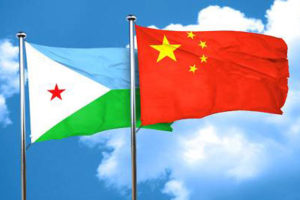China opened its first overseas military base in Djibouti in 2017. Now, after a year of operation, many details have surfaced to provide a better idea of Beijing’s reason for the base, and its wider global calculations predicated on the facility. Beijing has always couched the rationale for the base in benign terms. This narrative, however, disguises its broader and larger ambitions. It also hides the increasingly sophisticated approach that China has adopted to pursue its goals. Djibouti is a critical step in the global ambitions of China’s military.
China has consistently downplayed the importance of its outpost, including the capacity and purpose of the base. Before construction was completed, China called it an “overseas logistical supply facility.” That term gradually morphed, and now it is characterized as a “supply base” — still, however, not a “military” outpost. The Chinese media has been at pains to detail how the base cannot conceivably be compared to British or American facilities, for example, in terms of infrastructure, equipment and capabilities. The reason Beijing intentionally avoids the term “military base” is to dodge attention, suspicion and threat — mostly attention, albeit not successfully. For the undeniable truth remains: The base has been dominated, developed and used by the Chinese military.
Because of its state ideology of “non-interference” in extra sovereign matters and of non-alignment, China has always had trouble justifying its desire for an overseas military presence. It has sought, therefore, the fig leaf of legitimacy through UN Security Council mandates for peacekeeping missions, which come with host-country consent. And, in the case of Djibouti, we see how China manipulates this to incrementally raise the stakes.
In 2008, China began naval escort missions in the Gulf of Aden following a series of Security Council resolutions authorizing countries to conduct counter-piracy operations in the area. In the 10-year period from 2008, China dispatched 30 naval escort taskforces to the region, at a steady rate of three a year. The missions provided grounds for China to claim it needed a logistics center to provide support and supplies for its forces in the area. Enter, then, Djibouti, with its unique geographical location. It also had the virtue of being popular with other foreign military forces operating in the area (the Chinese have made private requests to visit their American neighbors, but were rebuffed by the Pentagon).
The hidden agenda approach China has deployed, using UN mandates and debt to get what it wants in Djibouti, is worrisome.
Yun Sun
The problem is, China’s story doesn’t hold up. Piracy off the Somali coast sharply fell between 2012 and 2017 — precisely the period China negotiated for and built its “supply base” in Djibouti. In other words, although China predicated its need for a logistics hub on serving UN-authorized counter-piracy missions, the development of the base happened when the threat of piracy was in rapid decline.
Following the opening of the base, China has been consolidating its control and increasing the capacity of the facility. This is being achieved in parallel with generous Chinese financing for a new port, free-trade zone, and railway, energy transportation and water supply projects. In May, the Chinese military acknowledged it was building a new wharf at the Djibouti base. The development of infrastructure supports the operation of the Chinese base, and also hitches the Djibouti government into the Chinese orbit. Djibouti is taking on a public debt that is equivalent to 88 percent of its GDP, with China owning most of this. With so much owed to China, Djibouti’s ability to defy or reject Chinese demands is significantly hindered.
Although China has portrayed the base as logistics-oriented, its own actions suggest less benign uses. Two months after its opening, China began military training and live-fire drills on the ground to, in the words of the army, “explore the model of overseas military deployment and improve the Chinese troops’ ability to comprehensively maneuver weapons and conduct diversified military missions.” It has also expanded the scope of its troops stationed there. Now, they are also to provide “humanitarian assistance” and to “(contribute) to the peace and stability of Africa.”
There is, of course, no rule in international law against China developing overseas military bases, just as there is no reason that China should be judged any differently from other great powers with bases in Djibouti. However, the manner in which China has gone about building out its military capacity invites suspicion. Moreover, China cannot definitively prove and defend its supposed benevolent intention. The hidden agenda approach China has deployed, using UN mandates and debt to get what it wants in Djibouti, is worrisome. China’s playbook simply defies the rules of the game.
Indeed, intention is everything in diplomacy. And China’s intentions vis-a-vis Djibouti is just the starting point. Djibouti is the opening chapter to a greater Chinese military presence overseas. Now that China has gathered the experience, learned the requisite lessons and gained enough know-how, sources inside Beijing say it is only a matter of time before more overseas bases are built.
Overseas expansion is a slippery slope, and it is never difficult for great powers to develop creative (or self-styled “legitimate”) arguments for more. Imperial Germany demanded its “place in the sun” in the late 1890s, paving the way for its naval expansion. Japan hawked the idea of a “Greater East Asia Co-Prosperity Sphere” to justify its World War II occupation, which was much resented across Asia, including in China. Beijing might claim exceptionalism, and that its actions transcend the realpolitik calculations of other states. Yet, in that case, it is no different from the American hegemonists that it enjoys criticizing so very much.
- Yun Sun is director of the China program and co-director of the East Asia program at the Stimson Center in Washington. Her expertise is in Chinese foreign policy, US-China relations and China’s relations with neighboring countries and authoritarian regimes. Copyright: Syndication Bureau. www.syndicationbureau.com







































